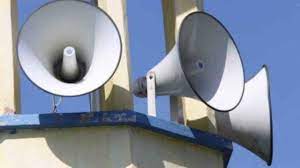By: Adebowale Bello. Freelance Health Writer with medical review and editorial support by the Datelinehealth Africa Team

A source of noise pollution in sub-Saharan Africa
The ability to hear sounds helps us to have meaningful communication with others and enjoy life.
When wanted sounds are combined gracefully, they can be pleasing to hear.
Unwanted sound, also known as noise can be unpleasant and if it persists, it becomes a form of pollution (noise pollution). This can be harmful to health and wellbeing.
Apart from causing damage to the eardrums with resultant temporary or permanent deafness, studies have also shown that noise pollution is independently associated with non-hearing related stress induced illnesses, sleep disruptions, speech related problems, lost productivity and high blood pressure among others. (1)
In this article, we will focus on the impact of noise pollution on blood pressure levels. But before we dive into this, let us remind ourselves of what hypertension is and be clear of what constitutes noise.
Hypertension which is also known as high blood pressure is a medical condition wherein blood pressure levels are always high. (2)
Blood pressure is the force with which the heart pumps blood, a normal blood pressure is lower than 120/80 mmHg and a constant increase over this figure leads to either stage 1 or 2 hypertension. (2)
The roles that environmental, lifestyles, genetic and medical factors play in the causation of primary and secondary hypertension respectively are well known. (2)
The unit of sound measurement is called decibels (dB). So, to get an understanding of what constitutes noise, let us look at some figures.
According to the US Centers for Disease Control and Prevention, (3) normal conversation has sound measurement of about 65 dB and sound that is just above ten percent of this level (i.e. above 70 dB) and occurs over a prolonged period may be considered noisy, annoying and start to damage hearing. Immediate damage to hearing occurs with loud noise above 120 dB.
So, a lot is known about the impact of noise on hearing and ear health, but not as much is known about the impact of noise on other aspects of health like cardiovascular health.
Urban noise arises from various sources that can be classified into two sources:
I. Outdoor sources, and
II. Indoor sources
Outdoor sources of noice include:

These incredible figures lead to increased traffic and due to impatience, drivers especially in sub-Saharan African cities constantly honk their horns to express displeasure (road rage) at the ever-present road congestion and driving infraction..
If you reside around places with high vehicular movement and traffic congestion, evidence indicates that the constant noise could elevate your blood pressure levels. (1)


This is because of the industrial machinery and equipment which are used in production. Factory workers who work in such factories are provided with protective equipment like earplugs which in most cases are inadequate.
Indoor sources of noise include:
From crying children to the use of home appliances like blenders and high-definition stereos, the home could be a constant source of noise pollution.
Some examples of everyday sounds and noises with their measurements in decibels and typical human responses are shown in Table 1 below.
Click on image to enlarge.
Also click on the video below to learn more about the sources of noise and the impact of noise pollution
Video: Noise pollution. Click on video icon to play.
Simply put, noise does not directly cause hypertension but it can increase the risk of developing hypertension.(1)
"Research has found that people who are regularly exposed to high levels of public noise are more likely to develop hypertension than those who live in quiet environments", said Dr Ketan Parmar, a psychiatrist and mental health expert at the B Y L Nair Hospital, Mumbai, India
Studies have shown that noise triggers the nervous system which in turn causes the release of chemical substances (stress hormones) such as cortisol, adrenaline and noradrenaline. (5)
This increase in stress hormones negatively affects the body and could lead to an increased heart rate which applies more pressure on the heart to raise arterial blood pressure to hypertension level.
Alongside the increased stress levels, lack of sleep due to constant urban noise disturbs sleep patterns making it more difficult for individuals to benefit from quality sleep. This constant sleep deprivation can lead to medical conditions like obesity and depression which could cause high blood pressure, added Dr Parmar.
Some other cardiovascular related conditions which can be induced by noise include diabetes and stroke.
Though hypertension can be caused by other factors, the risk of noise-induced hypertension increases if you fall into any of the following categories;
Apart from the increased risk of hypertension, noise pollution has other adverse effects on millions of people worldwide.
Some of these unfavourable effects include:
1. Hearing Loss: This is the most common effect of noise pollution. It can be caused either by repeatedly listening to sounds at high volumes such as when using headphones or by an unexpected one-time sound blast just as in explosions. (6)
It can be either temporary or permanent and most times occurs gradually over some time.
On the other hand, continuous exposure to loud noise could lead to a constant ringing in your head which is known as "tinnitus" and it can also be temporary or occur for life. (7)
2. Increased mental stress: Research has shown that noise could increase mental stress levels because noise induces annoyance, which in turn could lead to depression and anxiety. (8)
Other medical conditions that are associated with noise include
Dr Parmar highlighted that taking part in noise awareness campaigns and soundproofing your home are highly effective ways to curb noise pollution.
Some other measures which you can take to minimize noise pollution and prevent noise-induced hypertension include;
The negative effect that noise has on hearing health is well documented globally. But less is known about the impact of noise pollution on non-hearing related systems of the human body; especially the heart, blood vessels and blood pressure (the cardiovascular system).
Some studies have shown that noise pollution has an independent association with the risk of high blood pressure through the stress provoking pathway. More research is needed especially in sub-Saharan Africa where the burden of hypertension is reported high, to establish this association.
Given what we know about the adverse effect of noise pollution on auditory and non-auditory related health from other areas of the world, adequate measures need to be put in place both by governments in sub-Saharan Africa and by each individual to reduce environmental noise pollution and prevent related health issues.
Implementation of policies, codes, regulations and enforcement measures for traffic management, the citing of urban housing projects, industrial workplace standards and environmental noise reduction should be driven by evidence from well-funded research.
This will help to ensure healthier, noise-free and more peaceful living in sub-Saharan African communities and possibly play a role in reducing the burden of hypertension in the region.
1. de Souza TCF, Périssé ARS, & Moura M. Noise exposure and hypertension: investigation of a silent relationship. BMC Public Health 15, 328 (2015). https://doi.org/10.1186/s12889-015-1671-z
2. Dateline Health Africa. (2023) Hypertension in Nigerian Adults: Essential things to know. Accessed June 16, 2023.
3. Centers for Disease Control and Prevention. What noises cause hearing loss? Last reviewed Spet. 8, 2022. Accessed July 8, 2023. Available from https://www.cdc.gov/nceh/hearing_loss/what_noises_cause_hearing_loss.html
4. Which Car? (2022). How many cars are there in the world? Accessed June 16, 2023..
5. Münzel T, Sørensen M, Schmidt F, Schmidt E, Steven S, Kröller-Schön S, Daiber A. The Adverse Effects of Environmental Noise Exposure on Oxidative Stress and Cardiovascular Risk. Antioxid Redox Signal. 2018 Mar 20;28(9):873-908. doi 10.1089/ars.2017.7118. PMID: 29350061; PMCID: PMC5898791.
6. Centres for Disease Control and Prevention. Preventing Noise-Induced Hearing Loss. Last updated July 21, 2022. Accessed June 22, 2023..
7. National Institute Health. National Institute of Deafness and Other Communication Disorders. Noise-Induced Hearing Loss. Last updated March 16, 2022. Accessed June 22, 2023.
8. Hahad O, Prochaska JH, Daiber A, Muenzel T. Environmental Noise-Induced Effects on Stress Hormones, Oxidative Stress, and Vascular Dysfunction: Key Factors in the Relationship between Cerebrocardiovascular and Psychological Disorders. Oxid Med Cell Longev. 2019 Nov 11;2019:4623109. doi 10.1155/2019/4623109. PMID: 31814877; PMCID: PMC6878772.
9. Forest Research. (n.d.). Noise Abatement. Accessed June 22, 2023.
Published: July 10, 2023
© 2023. Datelinehealth Africa Inc. All rights reserved.
Permission is given to copy, use and share content without alteration or modification and subject to attribution as to source.
DATELINEHEALTH AFRICA INC., is a digital publisher for informational and educational purposes and does not offer personal medical care and advice. If you have a medical problem needing routine or emergency attention, call your doctor or local emergency services immediately, or visit the nearest emergency room or the nearest hospital. You should consult your professional healthcare provider before starting any nutrition, diet, exercise, fitness, medical or wellness program mentioned or referenced in the DatelinehealthAfrica website. Click here for more disclaimer notice.